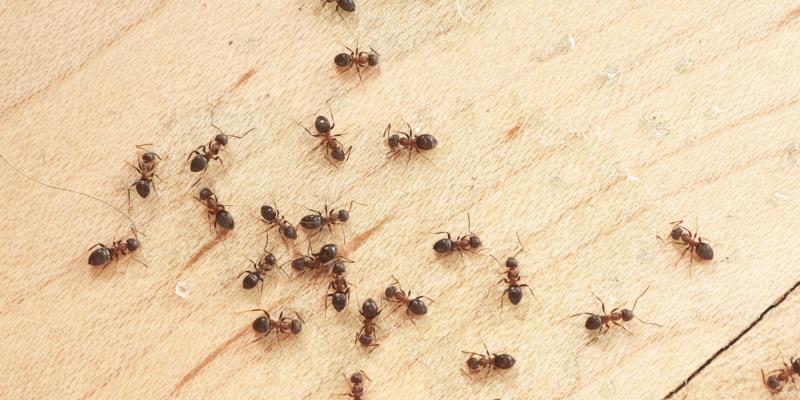Why Are There Ants In My House?

Ant infestations in houses are a common problem that many homeowners encounter. These tiny pests can invade your living space, causing annoyance and frustration. So, why are there ants in your house? There are several factors that contribute to an ant infestation, including the presence of food sources and water, access points, and the behavior of different ant species. Understanding the causes of an ant infestation can help you take the necessary steps to prevent and eliminate these pesky pests from your home.
Common Types of House-Invading Ants
Ants are one of the most common household pests, and they can easily invade your home in search of food and water. Understanding the different types of ants that may infest your house will help you identify and address the problem more effectively.
Here are some common types of house-invading ants to look out for:
- Odorous House Ants: These ants are attracted to sweet and greasy foods, and they leave behind a distinct odor when crushed. They often form large colonies and can be found throughout the year.
- Carpenter Ants: These ants are attracted to damp or decaying wood and can cause significant damage to wooden structures. They do not eat wood like termites, but they excavate tunnels and can weaken the integrity of your home.
- Pavement Ants: These small brown ants typically nest under sidewalks or driveways and can easily find their way into your home through cracks and crevices. They are attracted to sugary foods and can be quite persistent in their search for food.
- Acrobat Ants: These ants get their name from their ability to raise their abdomen above their head when disturbed. They are opportunistic foragers and will search for a wide range of food sources.
Sources of Food and Water Inside the Home
Ants are attracted to a variety of food sources, making it crucial to identify and manage these potential attractants in your home. Common sources of food and water that may attract ants include sugar, syrup, honey, fruit juice, meat, fats, and breadcrumbs.
To prevent ant infestations, it is essential to keep your kitchen clean and free from crumbs and spills. Make sure to promptly clean up any food particles on countertops, tables, and floors. Dirty dishes should be washed and stored away after use.
Using airtight containers to store food can also help deter ants, as they won't be able to access the contents. Additionally, be mindful of trash bins, as they can also serve as a food source. Regularly emptying and cleaning these bins can reduce the likelihood of attracting ants.
Addressing water sources is equally important. Fix any leaky pipes or faucets to eliminate standing water, as ants are drawn to moisture. Wipe dry sinks, countertops, and other areas to minimize water sources that may tempt ants.
Taking these preventive measures can help keep ants at bay and minimize the risk of an infestation. However, if you find yourself dealing with a persistent ant problem, it may be wise to consult a professional pest control company for effective treatment strategies and to prevent future infestations.
Prevention and Control Strategies for Future Infestations
Preventing and controlling future ant infestations requires proactive measures to keep these pesky pests at bay. By addressing common entry points and implementing proper storage and cleaning practices, you can significantly reduce the chances of dealing with a full-blown infestation.
Sealing entry points is crucial in preventing ants from infiltrating your home. Inspect doors and windows for any gaps or cracks and seal them with weatherstripping or caulk. Additionally, use foaming sprays to seal off any small cracks or holes where ants may be able to enter.
Professional Treatment Options for Sudden Infestations
When faced with a sudden ant infestation, it is crucial to consider professional treatment options. While DIY methods may provide temporary relief, hiring a trusted pest control company is the most effective way to eliminate ants and prevent future infestations.
Professional exterminators possess the knowledge and expertise to tackle a wide range of ant species. They can accurately identify the type of ant causing the infestation and tailor their treatment methods accordingly. This ensures that the chosen approach targets the specific needs of the infestation, increasing its effectiveness.
One common treatment option used by professionals is barrier treatments. These involve applying insecticides around the perimeter of the house to create a protective barrier that ants cannot cross. This method not only eliminates existing ants but also prevents new ones from entering.
Bait stations are another effective treatment method employed by professionals. These stations contain specially formulated baits that attract ants. Once the ants consume the bait, they return to their colony and spread the poison, effectively eradicating the entire colony.
By opting for professional treatment options, homeowners can enjoy the peace of mind that comes with a full-blown ant infestation being thoroughly and effectively addressed. Pest control professionals utilize their expertise and access to specialized products to eliminate ants from your home and implement preventative measures to reduce the risk of future infestations.
